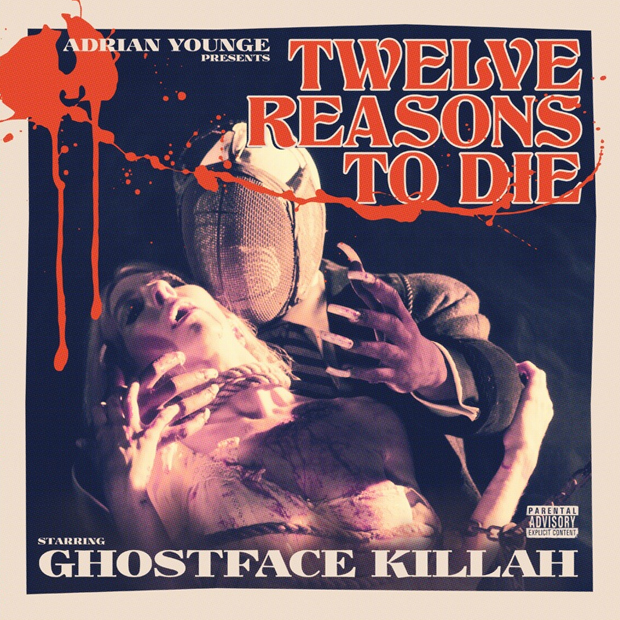Obscure soul revivalist Adrian Younge likes to dream up artistic worlds that are holistic in scope, where different musical flights of fancy are plucked from disparate genres and reassembled into vanity pieces that reflect the man’s obsessions. He likes the pulp of blaxploitation flicks and of kung-fu folklore, the camp of spaghetti westerns, and the sleaze of softcore porn soundtracks. In a recent interview with Fresh Air he revealed that, while he came up on hip-hop, he finds the lack of composition in its beats unsatisfying, hence his preference in reviving the cult career of 1970s soul group The Delfonics as opposed to, say, doing one-offs with MF Doom.
Fans of hip-hop should consider themselves lucky then that renaissance man Younge decided to throw his creative efforts behind Twelve Reasons To Die, a full-length concept album with Wu-Tang alumnus Ghostface Killah. The Wu is singularly awesome in hip-hop because it’s the only group in history whose outsized mythology matches the size of its talent. Filter away the kung-fu cinema worship and you’re still left with nine (or so) incredibly dope rappers. Because the Wu is larger than rap-life, it’s the only crew working today capable of bringing to fruition Younge’s vision of the criminal underworld as depicted on Twelve Reasons, one that’s as comfortable dealing in street violence realism as it is in spiritual revenge fantasy.
And who else to serve as muse for Younge’s lurid tale than Ghost? Among the Wu associates, Ghostface Killah is the most diversely talented: an everyman MC who sounds like he’s working incredibly hard physically, while effortlessly describing dramatic set pieces and spewing turns-of-phrase worthy of their own glossary. Critics who have previously leveled accusations of impenetrability in Ghost’s lyrics won’t find that problem here, as his first-person account of the album plotline features the dude in pure visceral MC mode.
Twelve Reasons illustrates the story of Tony Starks–the already hewn sub-identity used by Ghost on past solo work–a burgeoning criminal in the DeLuca crime syndicate. Through twists of fate involving inter-mob politics and double-crossing by way of a fated femme fatale character, Tony is murdered by the DeLucas and his physical remains are pressed grotesquely into 12 records and gifted to the dozen heads of DeLuca as trophies, the same way you’d hang a five-point buck or, yes, a platinum plaque, on the wall. The universe (or maybe God, or maybe karma, who knows?) grants Tony a chance at redemption and his apparition rises from the records to exact revenge in the form of the Ghostface Killah.
Fucking cool, right? The world dreamt up by Younge and Ghost is one where success is measured in the number of bricks moved and furs hanging in your closet, where black El Caminos are coffins, and hits are made with cold precision from the backseats of limos. That’s steel-hard street pulp already familiar to fans of the Wu, and a few Clan compatriots lend weight to assist in the narrative: Masta Killa, U-God, Inspectah Deck, and Cappadonna. Of course an outing like this wouldn’t be complete without the impartial storyteller who shows up in the form of RZA, a benevolent witness whose presence bestows a sort of holy rap blessing on the proceedings (in addition to his executive producer duties).
But the vision here is really all Adrian Younge’s, and his acute attention to detail makes Twelve Reasons go. Dusty percussion that “sounds live” (as he put it on Fresh Air) and composed melodies that echo the scores of Ennio Morricone dress all twelve songs. RZA is certainly a production influence, too, which you can hear in the urgency of “Blood on the Cobblestones” and the plinked organ on “An Unexpected Call” which sounds like it was borrowed straight from “Tearz.” But while RZA’s work, at least in its earliest forms, was raw, project basement jazz, Younge’s beats feel more fleshed-out. He works primarily with composition in mind, unafraid of layering operatic vocals up against Terminator X-style pitched record scratches. Twelve Reasons reaches its dramatic apex with “Enemies All Around Me,” when the DeLucas are on the verge of killing Tony Starks, and Younge pairs that moment with a ghostly vocal performance by The Delfonics’ William Hart, thus fully closing the circle of his musical affinities.
As an entire project, Twelve Reasons To Die is audacious–all of the album artwork, including a comic book, was conceived and generated by Younge himself–but the resulting album is surprisingly spare, clocking in at under 40 minutes. In a world of sprawling mixtapes and overwrought studio albums this would normally be welcome in hip-hop, but then Twelve Reasons exists apart from what heads are normally used to. The source material is so romanticized by its creator that a similar indulgence in the album’s length would have actually been welcome. It’s not often you’re left asking for more between-track skits, but in this case additional dramatic interludes would have served the plot development well.
But this is Adrian Younge and Ghostface Killah’s homage, and much of the material from which it spawned was also disjointed and fragmented in construction. As a pure entertainment piece, Twelve Reasons To Die appeals directly to the brain’s pleasure center. We don’t ask for reasons when fictional crime lords like the DeLucas do their dirt; we just sit back, cringe and, yes, sometimes smile and laugh, when the blood splatters.

